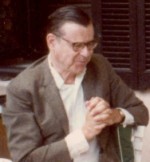Views
(Created page with '{{Bio_infobox |name-date=Holmes Hinkley Welch (1924-1981) |names=* Chinese Name 名字: Wēiěrqí 威爾奇 * Dharma name 法名: ?? |image= |birth=1924 |death=by suicide in…') |
m (→Important Works) |
||
| (4 intermediate revisions not shown) | |||
| Line 2: | Line 2: | ||
|name-date=Holmes Hinkley Welch (1924-1981) | |name-date=Holmes Hinkley Welch (1924-1981) | ||
|names=* Chinese Name 名字: Wēiěrqí 威爾奇 | |names=* Chinese Name 名字: Wēiěrqí 威爾奇 | ||
| - | * Dharma name 法名: | + | * Dharma name 法名: Shì Mohua <ref>According to this page [http://www.cloudwater.org/index.php/ch-an-buddhism/our-lineage]</ref> |
| - | |image= | + | |image=[[File:Holmes_Welch.jpg|center|Holmes Welch]] |
|birth=[[1924]] | |birth=[[1924]] | ||
|death=by suicide in 1981 in Boston, Massachusetts | |death=by suicide in 1981 in Boston, Massachusetts | ||
| Line 15: | Line 15: | ||
==Biography== | ==Biography== | ||
| - | + | During World War II, Welch served in the Russian sector of the State Department's Office of European Affairs. | |
| - | + | ||
| - | + | Welch wrote a number of books that are highly respected in the world of scholarship on Chinese religion. He wrote his first book, ''The Parting of the Way: Lao Tzu and the Taoist Movement'' (1957) while completing both his B.A. and his M.A. at Harvard University. | |
| - | * ''The Parting of the Way: Lao Tzu and the Taoist Movement | + | |
| - | * ''The Practice of Chinese Buddhism: 1900-1950 | + | After completing his degree, Welch moved to Hong Kong [[香港]] in 1957, where he served as a political officer in the office of the consulate general until 1959. |
| - | * ''Taoism: The Parting of the Way | + | |
| - | * ''Facets of Taoism: Essays in Chinese Religion | + | In the late 60's and early 70's, Welch wrote and edited five more books on Daoism and Chinese Buddhism, including his magisterial trilogy on 20th century Chinese Buddhism: ''The Practice of Chinese Buddhism: 1900-1950'' (1967), ''The Buddhist Revival in China'' (1968), and ''Buddhism Under Mao'' (1972). During this time, Welch was a research fellow at the East Asian Research Center at Harvard, a lecturer at both Harvard and Yale, and eventually assistant director of Harvard's Center for the Study of World Religions. |
| + | |||
| + | == Important Works == | ||
| + | * ''The Parting of the Way: Lao Tzu and the Taoist Movement''. 1957. | ||
| + | * ''The Practice of Chinese Buddhism: 1900 - 1950''. Cambridge, MA: Harvard University Press, 1967. | ||
| + | * ''The Buddhist Revival in China. With a section of photos by Henri Cartier-Bresson''. Cambridge, MA: Harvard University Press, 1968. | ||
| + | * ''Taoism: The Parting of the Way''. 1971. | ||
| + | * ''Buddhism Under Mao''. Cambridge, MA: Harvard University Press, 1972. | ||
| + | * ''Facets of Taoism: Essays in Chinese Religion''. 1979. | ||
==Notable Students== | ==Notable Students== | ||
| Line 31: | Line 39: | ||
==References== | ==References== | ||
| - | * Fairbank, J. | + | * Fairbank, J. K. "Obituary: Holmes Hinkley Welch (1924-1981)." ''Journal of Asian Studies'', vol. 40, no. 4 (August 1981): 864. |
[[Category:Biography]] | [[Category:Biography]] | ||
Current revision as of 00:47, 8 January 2012
Holmes Hinkley Welch (1924-1981)
|
| Notable Associates:
|
|
Holmes Welch (1924-1981) was an important American scholar of Daoism and early 20th century Chinese Buddhism.
Contents |
Biography
During World War II, Welch served in the Russian sector of the State Department's Office of European Affairs.
Welch wrote a number of books that are highly respected in the world of scholarship on Chinese religion. He wrote his first book, The Parting of the Way: Lao Tzu and the Taoist Movement (1957) while completing both his B.A. and his M.A. at Harvard University.
After completing his degree, Welch moved to Hong Kong 香港 in 1957, where he served as a political officer in the office of the consulate general until 1959.
In the late 60's and early 70's, Welch wrote and edited five more books on Daoism and Chinese Buddhism, including his magisterial trilogy on 20th century Chinese Buddhism: The Practice of Chinese Buddhism: 1900-1950 (1967), The Buddhist Revival in China (1968), and Buddhism Under Mao (1972). During this time, Welch was a research fellow at the East Asian Research Center at Harvard, a lecturer at both Harvard and Yale, and eventually assistant director of Harvard's Center for the Study of World Religions.
Important Works
- The Parting of the Way: Lao Tzu and the Taoist Movement. 1957.
- The Practice of Chinese Buddhism: 1900 - 1950. Cambridge, MA: Harvard University Press, 1967.
- The Buddhist Revival in China. With a section of photos by Henri Cartier-Bresson. Cambridge, MA: Harvard University Press, 1968.
- Taoism: The Parting of the Way. 1971.
- Buddhism Under Mao. Cambridge, MA: Harvard University Press, 1972.
- Facets of Taoism: Essays in Chinese Religion. 1979.
Notable Students
Notes
References
- Fairbank, J. K. "Obituary: Holmes Hinkley Welch (1924-1981)." Journal of Asian Studies, vol. 40, no. 4 (August 1981): 864.
